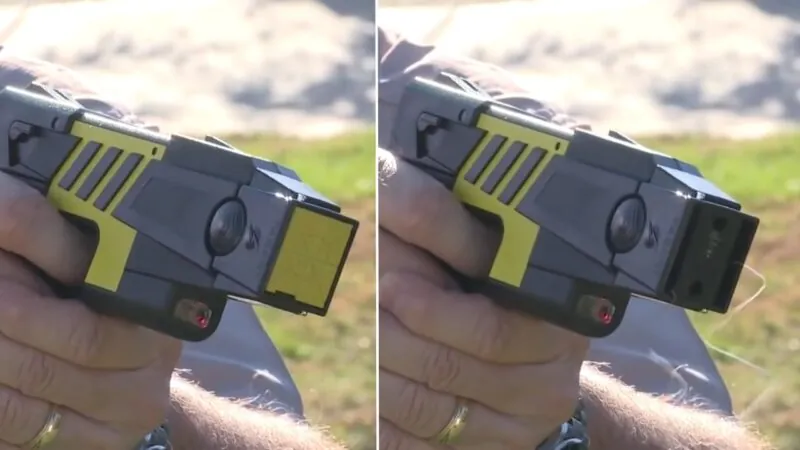Stun Guns for Safety are tools that can shock people and make them unable to move for a little while. This can help you get away from someone trying to hurt you. But stun guns have good and bad things about them. Let’s look at these so you can decide if a stun gun is right for you. If you know all the pros and cons, you will have important informations for keeping yourself safe.
We’ll also talk about how police use stun guns, which shows they can be tricky to rely on.
Stopping Attackers
Stun guns are good at stopping people who want to hurt you, like tasers. They give a high-voltage shock that messes up your muscles. This makes you freeze up for a bit, so you can run away. Just seeing and hearing a stun gun might scare off an attacker too. But how well it works depends on using it right and the situation. Practicing with a stun gun helps you use it better to protect yourself.
Police use stun guns to avoid hurting people too much. Like in New York, over 4,000 cops learned to use stun guns on suspects and people acting weird. But sometimes stun guns can be dangerous , like when Inman Morales sadly died. Still, studies show stun guns usually stop fights without bad injuries.
Easy to Use
Stun guns are simple, even if you don’t practice much. They’re small and light, so you can carry them easily and grab them fast. Unlike other self-defense stuff, you don’t need to be super strong to use a stun gun. Just push a button and it’s ready! This makes stun guns a good choice for all kinds of people. For cops, being able to use stun guns quickly is important.
They need fast ways to stop suspects without making things worse. Stun guns let them do that without deadly force. But the easy use also means you have to be really careful to avoid accidents.
Legal Stuff
It is crucial to understand the legal landscape surrounding stun guns in your local jurisdiction before purchasing or using one. The laws and regulations governing stun guns can vary significantly from place to place.
- Varying Legal Status:
- Some areas permit the ownership and use of stun guns with few restrictions, while others have much stricter rules or even outright bans. It is essential to research the specific laws in your city, county, and state to ensure compliance. Failure to do so could result in serious legal consequences.
- Historical Context:
- In the past, some police departments, such as the NYPD, initially prohibited the use of stun guns after incidents where they were misused or caused unintended harm. However, over time, many law enforcement agencies have come to view stun guns as a valuable tool for de-escalating confrontations and reducing the need for lethal force.
Balancing Safety and Self-Defense
Lawmakers often struggle to strike the right balance between allowing people to protect themselves and maintaining public safety. As a result, the legal landscape surrounding stun guns continues to evolve, with some jurisdictions relaxing restrictions while others maintain or even tighten controls.
Safety Worries
Even though stun guns aren’t meant to kill, they can still hurt people if you’re not careful. If it goes off by accident, you or someone else could get zapped. Always follow the safety rules. Also, stun guns might not work on everyone. People on drugs or with a high pain tolerance might not freeze up.
One time in Chicago, a cop’s stun gun didn’t stop a violent person, and the cop got really hurt. Stories like this remind us that stun guns have limits in really dangerous situations. Training helps understand when they’ll work and when you need something else.
Short Range
Stun guns only work up close. You have to be right next to the attacker to shock them. If you need to keep your distance, a stun gun won’t help much. Other self-defense tools like pepper spray or alarms can protect you from farther away. Cops know this too.
They often have to get really close to suspects, so stun guns fit some situations but not others. The need to be nearby limits when stun guns are the best choice.
Misusing Them
Like any self-defense tool, stun guns could be misused to threaten or hurt innocent people. You should only use them to protect yourself. Getting proper training helps prevent misuse. It’s important to understand this risk and be responsible. There are stories of stun guns being used unfairly against certain groups.
Making sure they’re only used properly is key to keeping the public’s trust.
Emotional Impact
Using a stun gun can really affect you emotionally. For some, just having a self-defense tool makes them feel safer. But actually shocking someone in a scary situation can be super stressful and traumatizing. Be ready for those strong feelings if you ever have to protect yourself. Cops face a lot of scrutiny when they use stun guns, which weighs on their minds.
Worrying about backlash can make them hesitate when they need to act. The emotional toll is an important part of deciding if stun guns are right for you.
Other Options
While stun guns are one potential self-defense tool, there are several other alternatives worth considering:
| Self-Defense Method | Description |
|---|---|
| Pepper Spray | Protects from a distance, incapacitates without lasting harm. |
| Personal Alarms | Emits loud sound to scare off threats and alert emergency services. |
| Self-Defense Training | Equips with physical skills and techniques, boosts confidence. |
The Choice is Yours
Stun guns can be a handy self-defense tool. They’re good at stopping attackers temporarily so you can get away, and they’re easy for anyone to use. But they also have downsides and risks you need to think about. Follow all laws and safety rules. And remember, stun guns aren’t perfect – they have limits in how well they work.
Look at options like pepper spray or self-defense classes too. The most important thing is choosing what makes you feel secure and able to protect yourself. It is very important to know the good and bad points, you can make the right personal safety choice for you.










